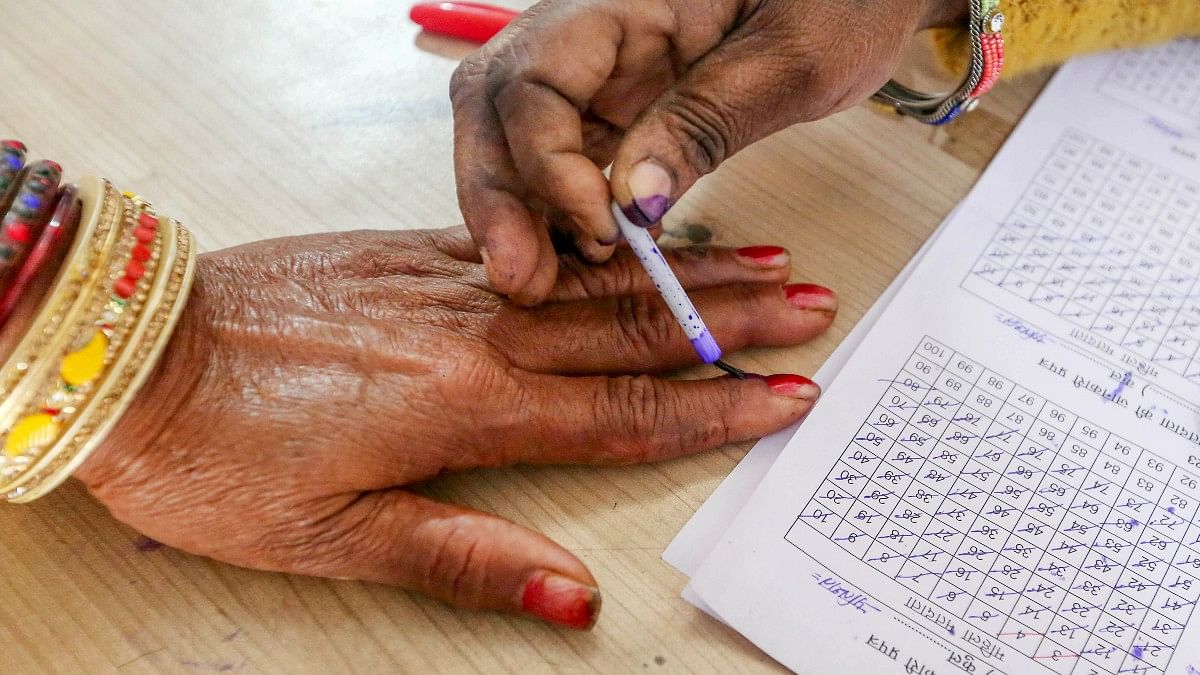New Delhi/Bhopal/Hyderabad: Free electricity, farm loan waivers, two-wheelers for girls, and financial assistance for women were among the many inducements — or ‘freebies’ as some may call them — that dominated the campaigns of parties across most of the five states that voted between 7 and 30 November.
The impact of these ‘freebies’ can be inferred from the results, particularly given the one-upmanship between the two major national parties, the BJP and the Congress, in outdoing each other with giveaways.
In MP, Chief Minister Shivraj Chouhan’s pledge of Rs 1,250 as monthly financial assistance for women under the Ladli Behna Yojana has been a force behind BJP’s revival in the state, even after 18 years of rule.
The BJP is sweeping the state with 165 seats at 2:30 pm.
In Telangana, like other states, the Congress, BJP, and BRS were in a three-sided race to announce ‘freebies’. The Congress may have offered the most appealing selection since it is currently ahead in the state, having won 64 seats.
Chhattisgarh, where the BJP is set to oust the incumbent Congress government, presents a slightly different scenario. Political analysts suggest that offering freebies may not necessarily give a huge edge in the state, but not doing so could be a significant disadvantage.
In Rajasthan, the Congress failed to break the anti-incumbency trend of the past three decades, despite the campaign riding on promises made by the Ashok Gehlot-led government, ranging from ration kits to free electricity and the Chiranjeevi scheme.
However, the impact of ‘freebies’ on elections is nuanced, varying across states. Their effectiveness hinges on factors such as regional context, governance credibility, and voter perception. Political analysts who spoke to ThePrint said that some states, like Madhya Pradesh, are more responsive to populist promises, while others, like Mizoram, are less so.
Also Read: ‘Target beneficiaries, revenue receipts’ — what EC’s proposal on poll promises wants from parties
Chhattisgarh
Political analysts said ‘freebies’ played an important role in the Chhattisgarh elections, where BJP is ahead in 55 seats, according to the trends by the Election Commission (EC).
The incumbent Congress had promised Rs 15,000 as annual financial assistance to women in the state. The BJP countered this by promising Rs 12,000 each year as financial aid for married women.
The Congress promised loan waivers, paddy procurement at Rs 3,200 per quintal and procurement of tendu leaves at Rs 5,500 per sack. The Congress had also pledged to waive off the loans of self-help groups and those availed of by women under the Saksham Yojana.
BJP, which was reduced to 15 seats in 2018, promised subsidised LPG cylinders, Rs 10,000 per year to landless agricultural labourers, and paddy procurement at Rs 3,100 per quintal, among other things.
Anupama Saxena, head of the department of political science at Guru Ghasidas Vishwavidyalaya in Chhattisgarh’s Bilaspur, said that while ‘freebies’ are an important factor, they are not the determinants of the electoral outcome.
“Freebies are not a single factor but if they are not there, there will be damage. And if they are, they might not benefit parties as much because people then take these freebies for granted,” said Saxena, who is also state coordinator of Lokniti-CSDS.
Rajasthan
While the BJP has emerged triumphant in the keenly contested Rajasthan polls, the Congress has managed to give some fight: it hasn’t lost as badly as it did in 2003 and 2013.
With 66 seats, the Congress has doubled its count in the state compared to its oustings in 2003 and 2013. The Ashok Gehlot-led administration was quick to announce ‘freebies’ well before the Model Code of Conduct (MCC) came into effect.
The Congress promised free electricity up to 100 units for households, up to 2,000 units for farmers, and an LPG subsidy. Additionally, the government committed to distributing free ration kits and providing laptops/tablets to students enrolling in government colleges.
Furthermore, the Gehlot-led government pledged to double the coverage under its flagship Chiranjeevi health insurance scheme to Rs 50 lakh and provide women with an annual stipend of Rs 10,000 under the Griha Lakshmi Yojana.
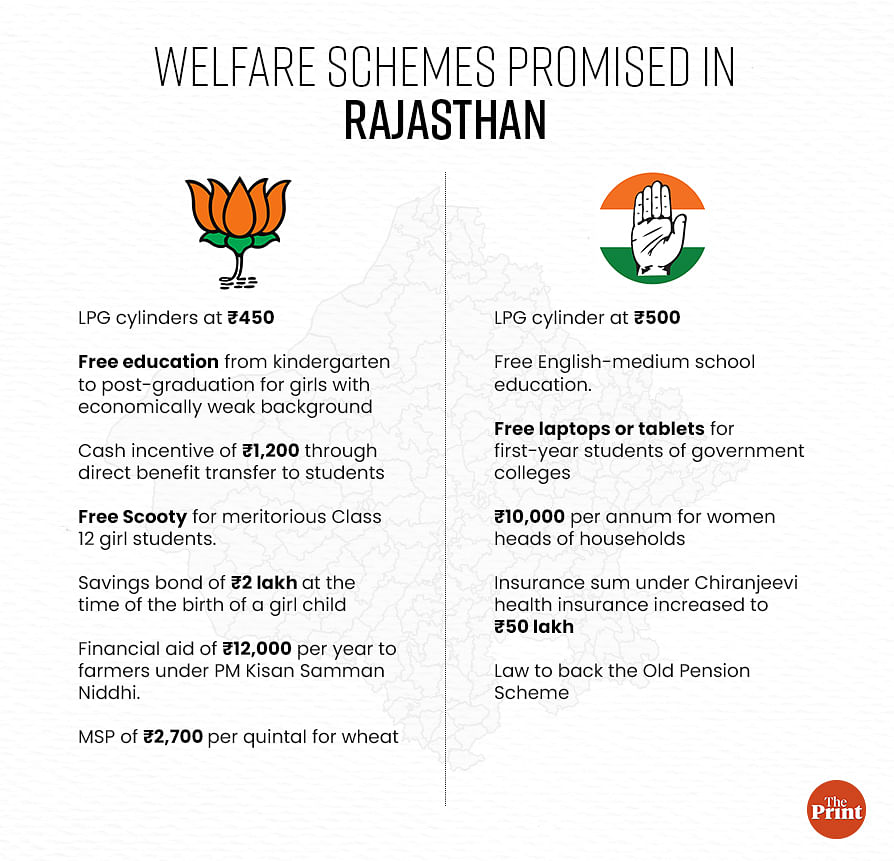
The BJP’s counter to these promises included cylinders at Rs 450 — Rs 50 lower than what the Congress promised — and free two-wheelers for meritorious Class 12 girl students.
The EC data shows that the turnout of women voters was slightly higher than that of men in Rajasthan.
Also Read: Is Gehlot destroying Rajasthan’s economy through freebies? Data shows this isn’t the case
Madhya Pradesh
Though BJP swept Madhya Pradesh, the state witnessed a close contest between the ruling BJP and opposition Congress in doling out ‘freebies’ to curry favour with voters.
BJP leaders claim the party rode on the wave of its Ladli Behna Yojana to come to power in the state for the fifth time in 20 years.
The Congress too, sensing that welfare schemes could make or break its prospects, announced Rs 1,500 as a monthly stipend for women under the Nari Samman Yojana to counter the BJP. Free electricity up to 100 units and loan waivers for farmers were among the many other promises made by both key players.
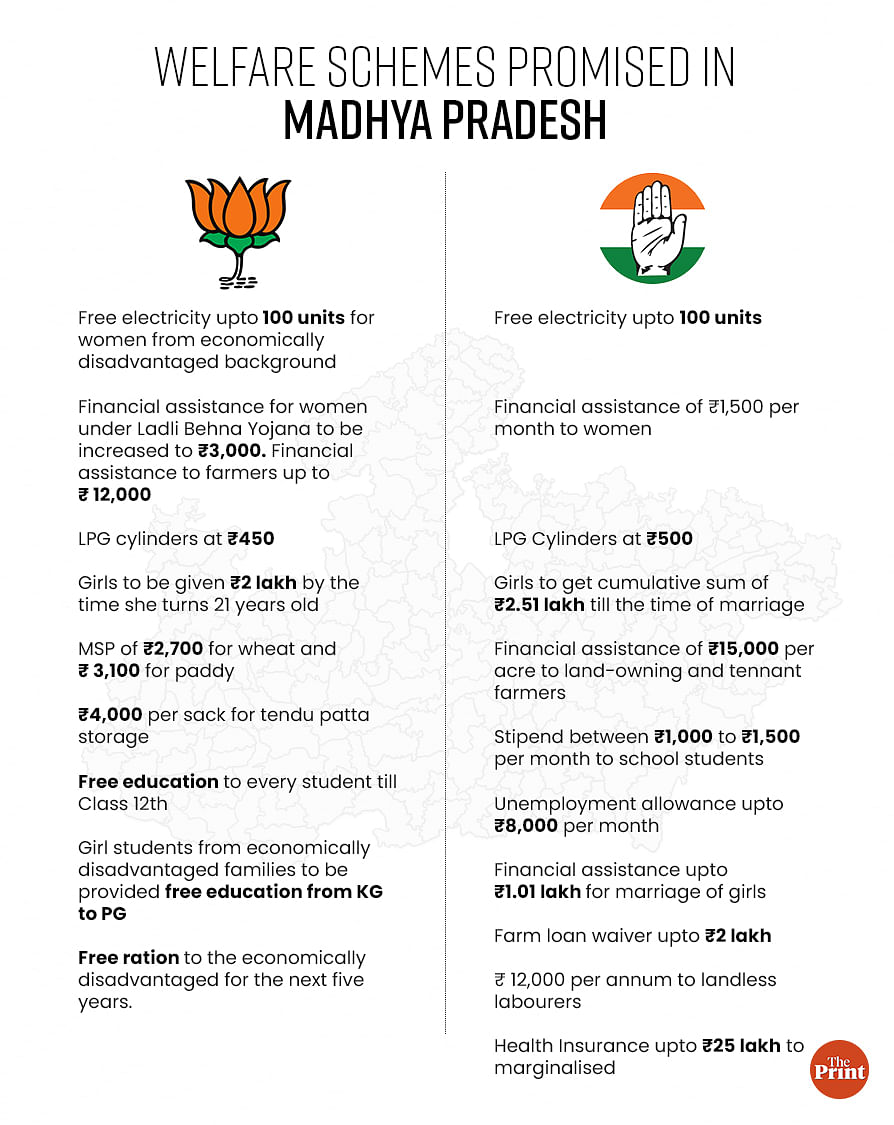
Dr Veerandra Singh Matsaniya, a political analyst and assistant professor with the department of economics at Dr Harisingh Gour Vishwavidyalaya in Sagar, suggested that MP’s electorate was particularly susceptible to the lure of freebies.
“Unfortunately, the lack of development and sources of employment for people from low-income groups makes them dependent on such freebies for survival. Political parties exploit this to widen their vote base,” Matsaniya told ThePrint. “Voters in MP, with low MGNREGA wages, are still migrating in large numbers and working on a daily wage of Rs 250. For them, these freebies are crucial — which makes the ground fertile for populism.”
The BJP, despite Prime Minister Narendra Modi himself criticising “revdi” culture, promised to match the Congress freebie-for-freebie in states that went to the polls, he added.
Matsaniya, however, underlined that executing these promises will pose critical challenges for any party that comes to power.
Telangana
India’s youngest state witnessed the Congress winning a historic mandate. It gave voters a menu of freebies to pick from, as did the BRS and BJP.
The BRS’s flagship Rythu Bandhu scheme, which entitles farmers in the state to Rs 10,000 per acre each year, was considered one of the key factors that ensured Chief Minister KCR’s return to power in 2018. But it failed to woo the state’s farmers this time around.
The Congress had promised to raise this entitlement to Rs 15,000 per acre, to which the BRS reacted by pledging Rs 16,000 per acre. Both parties also promised gas cylinder subsidies and monthly financial assistance for women — Rs 3,000 if the BRS returned to power and Rs 2,500 if the Congress was able to trounce the incumbent.
Additionally, the Congress vowed to provide free electricity up to 200 units, countering the KCR-led BRS government’s promise of offering farmers round-the-clock power at no cost.
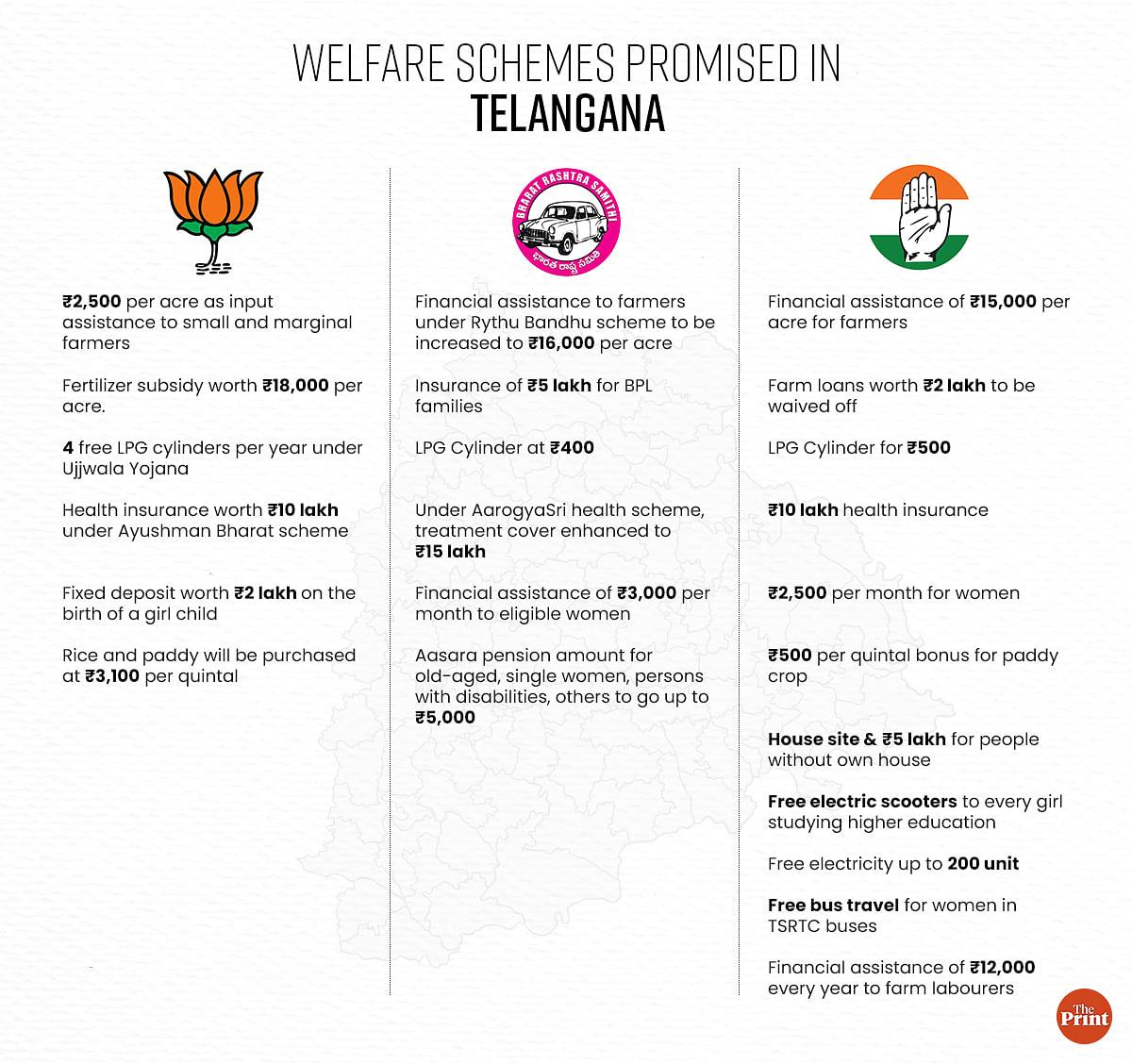
Akunuri Murali, political commentator and retired IAS officer, told ThePrint that freebies are “unsuitable” for sustainable development. “But voters have become receptive to such doles. (Freebies) are definitely showing an impact on poll outcomes, like the Rythu Bandhu and increased pensions’ beneficiaries favoured the TRS in 2018,” he added.
However, Murali, who is also the convener of Jago Telangana — a network of civil society groups — pointed out that freebies alone cannot guarantee victory.
“Good governance and credibility in implementing past welfare promises also matter,” he said.
Mizoram
Mizoram, where results will be declared Monday, was the only poll-bound state where the promise of ‘freebies’ didn’t take centrestage in election campaigns.
Neither of the two key regional players in the state, the Mizo National Front (MNF), which is fighting to stay in power, nor the Zoram’s People Movement (ZPM) had included any major welfare schemes in their poll promises.
But the ZPM, led by Lalduhoma, pledged a corruption-free government.
The Congress, which has always been a prominent force in the state, promised cylinders at subsidised prices and the return of the Old Pension Scheme (OPS) for government employees. The BJP, in turn, promised Rs 1.5 lakh as “cumulative” financial assistance for every girl child.
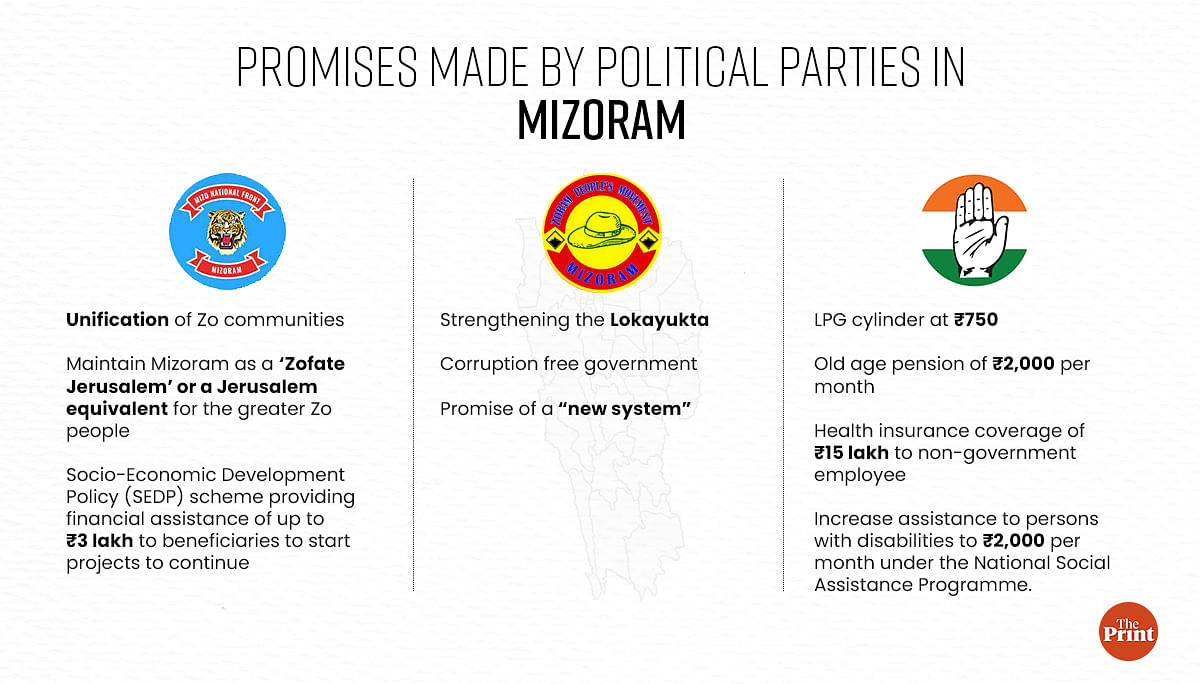
“There hasn’t been a lot of talk about freebies because voters (in Mizoram) are realistic. They don’t favour free things here and there,” said Professor J. Doungel of the department of political science at Mizoram University.
He told ThePrint that most voters in the state are more concerned about “common interest” than “self-interest”.
“The common interest of the state and society comes first, considering the teachings of the Bible and the church,” he added.
(Edited by Amrtansh Arora)
Also Read: Freebie culture may garner electoral triumphs, but India can hardly sustain resulting public debt

